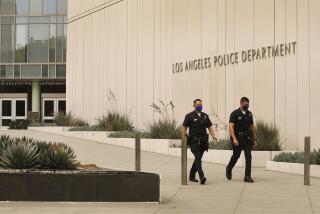Judge Denies Bid to Jail Man Freed by Court
- Share via
A Ventura County judge denied a request Monday by prosecutors to send an Oxnard man to jail on drug charges even after the state Supreme Court ruled that his conviction was unconstitutional.
Prosecutors argued that Cayetano Camacho missed a 30-day deadline to withdraw his guilty plea for drug possession and should serve a six-month sentence.
But defense attorneys said Camacho, 29, did not know about the Supreme Court ruling until three weeks ago and therefore still had time to meet the deadline.
Superior Court Judge Bruce Clark ruled that restoring Camacho’s guilty plea and sending him to jail would draw new questions from the appellate court. That court ruled last September that Oxnard police acted unlawfully when they climbed through the defendant’s window without a warrant.
Responding to Clark’s ruling, prosecutors decided Monday to drop all charges against Camacho, and the case was dismissed.
“It’s frustrating that a guilty person is going free,” said Senior Deputy Dist. Atty. Michelle Contois. “We want guilty people to be held accountable.”
Oxnard police were responding to an anonymous call about a loud party in June 1997 when they walked around to the side yard of Camacho’s house and saw him in his bedroom allegedly packaging cocaine. The officers climbed into the house from a slightly open window and arrested him on suspicion of possessing drugs for sale.
Camacho originally pleaded not guilty to the charges, his attorney said.
But as Camacho’s trial neared, a Superior Court judge refused to suppress the evidence gained through the window entry. The judge said police acted legally because the window did not have blinds and people could easily see into the room.
At the advice of his attorney, Camacho changed his plea to guilty and was sentenced in December 1997 to three years’ probation and six months in jail. The jail sentence was stayed pending an appeal. Camacho recently completed his probation.
The Court of Appeal ruled that Camacho’s right to privacy was violated when officers entered his house. The justices said it was reasonable for Camacho to expect that no one would trespass on his property late at night or look into his bedroom window.
Last fall, appellate justices ordered Camacho to return to Superior Court within 30 days to withdraw his guilty plea or face jail time.
The California Supreme Court affirmed that appellate ruling, stating that the police entry was an unreasonable search and seizure and therefore violated Camacho’s 4th Amendment rights.
In the decision, the Supreme Court justices wrote that most people would be “surprised, indeed startled, to look out their bedroom window at such an hour to find police officers standing in their yard looking back at them.”
They did acknowledge that their decision lets “an unquestionably guilty man go free.”
California Atty. Gen. Bill Lockyer decided not to appeal the case to the U.S. Supreme Court.
Contois said she disagreed with the court’s ruling, but understood that Clark was trying to be fair to the defendant. She still believes, however, that Camacho probably knew about the higher court’s decision.
“It just seems that if you won a Supreme Court decision, that you would want to tell your client about it,” she said.
Ventura County Chief Deputy Public Defender Michael McMahon said it would have been unfair--and unconstitutional--to lock up his client after his conviction was overturned. McMahon said the entire case, starting with the arrest, was handled poorly by the police and prosecutors.
“This case was 100% flawed from the start,” he said. “The [police] acted like peeping Toms--and then they crawled in his bedroom window without a warrant.”
But McMahon acknowledged that he and his colleagues may have failed to keep Camacho informed about the progress of his case. “If something fell through the cracks, it was partly from having so many different lawyers working for him,” he said.
More to Read
Sign up for Essential California
The most important California stories and recommendations in your inbox every morning.
You may occasionally receive promotional content from the Los Angeles Times.













